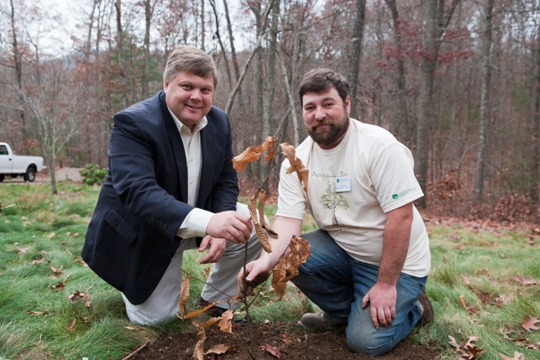When white folks first arrived on these shores, American chestnut trees were the dominant tree species from Georgia to Maine, providing food and shelter to countless forest organisms from mosses to songbirds to bears. Then in the early 1900s, the chestnut blight — a disease imported on infected nursery stock — virtually wiped them out. Scientists estimate the loss amounted to some 4 billion mature trees.
Now, thanks to the American Chestnut Foundation — and its genetic improvement program — the trees are closer to making a comeback. A celebrated planting of blight-resistant trees at the North Carolina Arboretum earlier this week marks a fresh milestone for the once-doomed tree.
Foundation geneticists did the painstaking work of developing the blight-resistant trees, starting with individuals that were a 50-50 mix of our native American chestnut with the Chinese variety, which isn’t affected by the disease. The geneticists bred those hybrids with pure American stock, “backcrossing” three times to weed out the Chinese genes, while maintaining disease resistance in their progeny through the selection of individuals field-tested for immunity. The result is a tree that is nearly pure American.
Dr. Fred Hebard, chief scientist on the project, puts a number on the purity of the latest generation, now taking root at the Arboretum: “The trees are fifteen-sixteenths American chestnut, on average,” he tells Xpress. The plan is to eventually plant resistant trees, and lots of them, throughout the public and private forests of this region.
This weeks’ planting is another step in the right direction, Hebard says. How will scientists measure the ultimate success of the overall reintroduction program? “When there are 100-foot-tall chestnuts once again,” he says, standing in the wild, natural forests of their former range. “The proof is in the pudding.”



So for nearly 100 years most people have never had to deal with the mega spiny and extra sharp husk with velcro like tendencies that surrounds the chestnut. Plenty people gonna be in for a very painful native awakening.
In a generation or three.
I believe this is nothing short of a miracle, albeit a scientific one — a quintessential landmark of the American east can be reintroduced to us for our children and grandchildren to appreciate. Perhaps spiny, but 15/16ths percent true to our heritage.